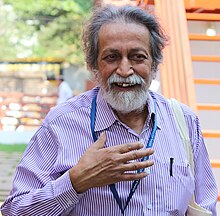Prabhat Patnaik
Indian economist
Prabhat Patnaik(born 19 September 1945) is an IndianMarxist economistand political commentator.

Quotes
edit- TheHindutvamovement as it has emerged is, almost in a classical sense, Fascist in its ideology, Fascist in its class support, Fascist in its method, and Fascist in its program. All the ingredients of a Fascist ideology are present in it: the attempt to unify the majority under ahomogenizedconcept, 'the Hindus'; a sense of grievance against alleged injustices done to this homogeneous group in the past by an excluded homogeneous minority; a sense of cultural superiority vis-à-vis this minority; a reinterpretation of history exclusively in these terms; a total rejection of contrary evidence, of dispassionate analysis, of the scientific method, indeed of rational discourse; and above all an appeal to the so-called homogeneous majority in passionate, blood-curdling, and essentially male chauvinist terms to 'stand up', 'assert their manhood', 'show that it is blood and not water that flows in their veins', all of which amount to an incitement violence, and result in actual violence, against the minority group.… Its appeal is based not on the dreams of a better or more prosperous or meaningful future, but upon hatred.
- "Fascism of our times."Social Scientist,vol. 21, no. 3/4, 1993, pp. 69–70.
The World At Crossroads,2020
edit- The World At Crossroads,29 May 2020,NewsClick
- The abrogation oflabour lawsinBharatiya Janatat Party-ruledstates(which could not have been done withoutModi’s approval) is meant to make thelabour marketmore insecure rather than less. SomeIndian Revenue Serviceofficers were punished recently for even suggesting that highertaxesshould be collected from the rich. In short, theModi governmentin its mindlessness is still picking up the intellectual crumbs that had fallen from theHigh Tableof the metropolitan establishment “four decades” ago, without realising that the world has moved on.
- Just as inthe 1930s,worldcapitalism,as it had existed until then, had reached a dead-end, and the need for it to be altered for the sake of preserving thesystemitself, was emphasised by many perceptivebourgeoisthinkers, exactly in a similar mannercontemporary world capitalismtoo has reacheda dead-endand cannot continue as before. [...] Any change in capitalism, however, including a revival of the so-called "welfare capitalism"of thepost-Warperiod, will entail a loosening of thehegemonyofinternationalfinance capitaland hence will face stiff opposition from it. The fact that the need for such change is clear to bourgeois thinkers, does not mean that finance capital will simply voluntarily make a sacrifice of the hegemony it currently enjoys. Indeed the history of the 1930s itself bears witness to this fact. [...] Boostingaggregate demandfor overcoming massunemploymentfinally got accepted as governmentpolicyonlyafter the warwhen the weight of theworking classin theadvanced countriesbecame much greater than before (of which the victory of theLabour Partyin theBritish post-war electionsand the vastly increased strength of theCommunists in FranceandItalywere obvious markers), and when theRed Armycame right up to the very doorsteps ofWestern Europecreating fears of a “communist takeover”.This conjuncture finally forced concessions from finance capital that had been unobtainable till then.Finance capital, in other words, does not voluntarily make concessions even when such concessions are seen by major pro-capitalist thinkers as being essential for the preservation of the system itself.
- It is real-lifeclass struggle,informed no doubt byideas,that ultimately determines which way theworldwill move.Hence even for altering contemporary capitalism in the direction of the so-called “welfare capitalism” of yore, it would be essential to have the working class fighting for such anagenda.But when it does so, and when international finance capital resists such an agenda, we would be in the thick of class struggle. Time alone will tell whether this struggle would remain merely at the level of achieving a revival of “welfare capitalism” or whether it would gobeyond capitalismaltogether towards asocialistalternative.Once class struggle, for changing the system in its present form, acquires momentum, its outcome would depend onpraxisand may not necessarily remain bounded within the system itself.
- The ruling formation in India, however, is totallyobliviousof the world conjuncture. The dead-end ofneo-liberalism,which is visible to even bourgeois thinkers in the metropolis, isinvisibleto ourHindutvabrigade. Not only is the Modi government still wedded to the neo-liberal agenda in general, but it has not even deviated from this agenda in the midst of the acutehumanitarian crisisunleashed bythe pandemicand its own mindlessresponseto it.
- Far from the pay cheques ofprivate sectoremployees coming out of the budget, the government has robbedcroresof workers, including 14 croremigrant workers(of whom around 10 crore areinter-state migrants), of theirincomes,jobs and accommodations, without giving apaisaby way of compensation. This is partly no doubt the result of the utter inhumanity of the Modi government; but partly also it expresses its utter pusillanimity vis-à-vis finance capital, which it seeks to sustain through negatingcivil libertiesanddemocratic rightsand promoting acommunalagenda that aims to divide people. But following the same track as was being followed in the "last four decades" and not recognising the dead-end of neo-liberalism, also means remaining stuck in that dead-end, which in turn would mean even greater recourse toauthoritarian-fascisticmeasures and even more odious attempts to promote a communal divide. The working people will have to struggle against this entire endeavour and to show the way out of the dead-end of neo-liberalism.
External links
edit- Home page at JNU
- Audio of Prabhat Patnaik on "The State under neo-liberalism" 30 October 2006
- Video of Joseph Stiglitz and Prabhat Patnaik discussing "An Emergent India: Prospects and Problems" 13 Feb 2007
- Audio of Prabhat Patnaik's lecture on "The Global Economic Crisis" 2 December 2008